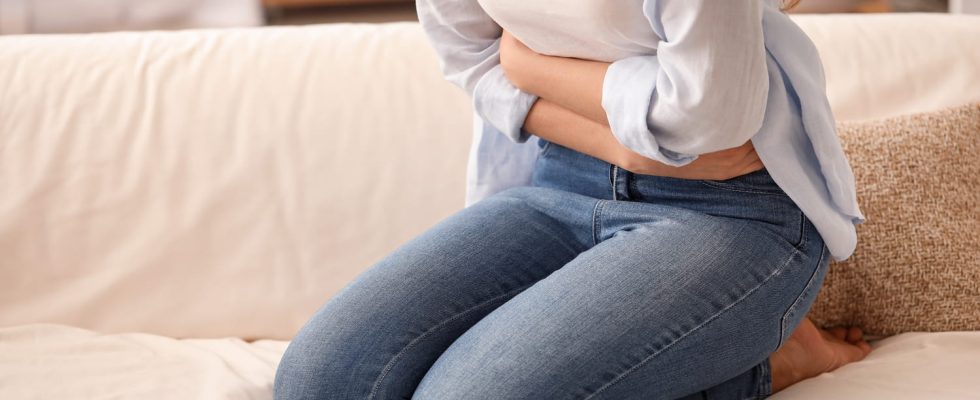Pain in the lower abdomen, bleeding outside of menstruation… Endometriosis is a gynecological disease that affects 1 in 10 women of childbearing age. Often poorly identified, it is the subject of many delays in diagnosis. So what signs to know?
Endometriosis is a gynecological disease which affects approximately 1 in 10 women of childbearing age In France. It is characterized by the presence of tissue similar to the lining of the uterus (endometrial tissue) that is growing outside the womb. If endometriosis is deeplesions can affect different organs: ovary, rectum, bladder, vagina, uterosacral ligaments… And these lesions lead (but not always!) to the appearance of symptoms. How to recognize endometriosis? What are the suggestive signs ? When and who to consult? Answers with Dr. Olivier Donner, gynecologist-obstetrician.
1. Painful periods
The most characteristic symptom of endometriosis is pain. “Pain that can occur just before menstruation, during menstruation (dysmenorrhea) or even between the rules. It’s about a pelvic pain which varies according to women“, explains our interlocutor. The pelvic pain is located at the level of the small pelvis, at the back of the uterus. Typically, it manifests itself by a sensation of burning or electric shock at the level of the lower abdomen and can radiate towards lower back or legs.
2. Pain during intercourse
“Some women complain of pain during intercourse – they are called “dyspareunia” – which occur either in certain positions or in all positions. These pains generally occur in positions in which penetration is the deepest” (like the anvil or the Andromache), indicates the gynecologist-obstetrician.
3. Chronic pain in the lower abdomen
Endometriosis can cause recurrent pelvic pain (which persists for more than 6 months) and occurs between periods. This cyclic character is also suggestive of the disease. I’Inserm specifies that 40% of women who present with chronic pelvic pain have endometriosis.
4. Urinary burns
“Endometriosis can cause pain during urination, like burning sensationswhich may mistakenly suggest a urinary tract infection“, indicates the gynecologist. Endometriosis can also cause pain during defecation (expulsion of feces), sometimes associated with the presence of blood in stool.
5. Heavy periods
Endometriosis can cause abnormal bleeding which are manifested by heavier or longer periods, which are medically called menorrhagia. We speak of heavy periods when:
► the bleeding period lasts more than 7 days
► we lose more than 80ml of blood per menstrual cycle (this represents on average a change of sanitary protection every hour)
► we lose important blood clots several centimeters.
6. Abnormal bleeding outside of periods
Endometriosis can lead to bleeding between periods (spotting whether they are light and occasional or metrorrhagia if they are abundant and almost permanent) as well as contractions of the uterus which cause pain. “These bleedings are related to adenomyosis, a form of internal endometriosis that invades the muscle of the uterus. It is a form of endometriosis common between 35 and 40 years old and rarer in young women“, specifies our interlocutor.
7. Alternating diarrhea/constipation
Endometriosis can also cause pain related to intestinal transit. “If the endometriosis affects the intestine, it can block the transit, while during menstruation, the endometriosis will inflame and cause an acceleration of the transit. The women affected by this problem therefore complain ofalternating constipation and diarrhea“, observes our specialist. Symptoms that are very debilitating on a daily basis.
8. Infertility
“It is estimated that 50% of patients who suffer from endometriosis (not necessarily at an advanced stage) have fertility problems. Endometriosis is often associated with the idea of not being able to have children. However, this is false. Endometriosis creates infertility when present. But when treated, it is entirely possible to get pregnant.“, wishes to restore our interlocutor.
9. Shoulder pain
In rare cases, the lesions may be very away from the uterusfor example at the diaphragm, that is to say quite high at the level of the abdomen. “And these lesions can cause pain below the ribs during menstruation. These pains can even go up to the level of the shoulders. Superficial endometriosis lesions are deposited in the lowest places. As women spend two-thirds of their time sitting or standing, the lowest part of the belly is the cul-de-sac of Douglas, in other words, the part that is just behind the uterus and this is where women have pain most often. In contrast, when lying down, the lowest part of the abdomen is just behind the liver. there may be endometriosis there. A woman who complains of shoulder pain during menstruation needs to be heard. It is not trivial, even if it remains rare“, details our expert.
10. Back pain
There are symptoms that are related to illnesses that are at a more advanced stage in terms of pain. “Pain in the middle of the back during menstruation can be a sign of kidney damage. Indeed, in extreme cases, an endometriosis that has spread can affect the ureters (tubes that bring urine from the kidney to the bladder) and prevent urine from going into the bladder. Urine accumulates in the kidney, which ultimately affects its functioning and in the most severe cases, leads to a total loss of kidney function“, warns Dr. Donner.
► If you notice the occurrence of one or more of these symptoms, it is important to speak to his attending physician or at her gynecologist who can then refer you to specialists if endometriosis is suspected. Examinations (for example, a pelvic ultrasound, a pelvic magnetic resonance, etc.) may be carried out to make a diagnosis.
Does endometriosis without symptoms exist?
You should also know that certain forms of endometriosis are asymptomatic and evolve silently. In this case, the disease is usually discovered incidentally.
Thank you to Dr Olivier Donner, gynecologist-obstetrician at the Urban V Polyclinic, Elsan establishment, which is part of all the Private Hospitals of Vaucluse in Avignon.
